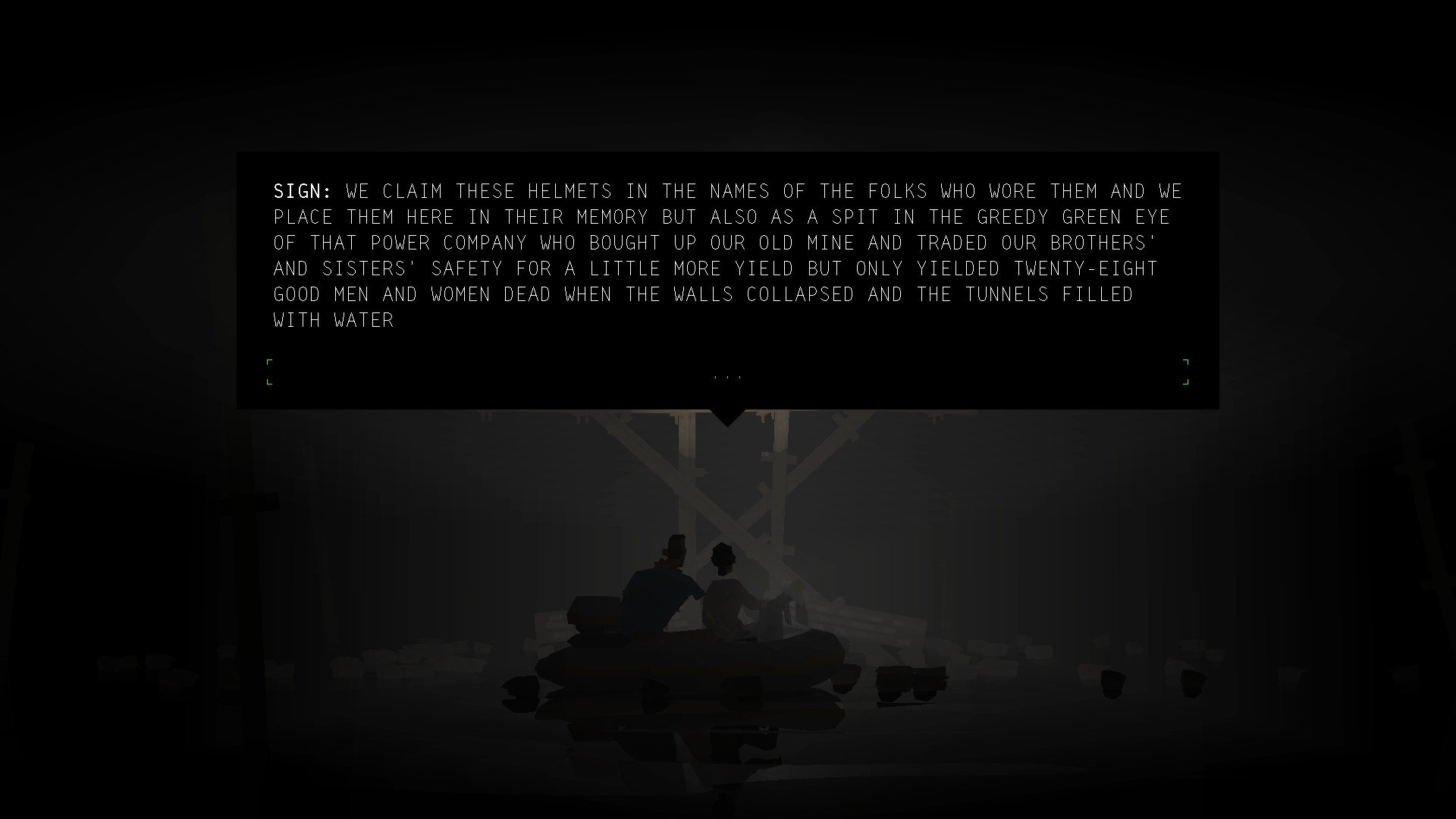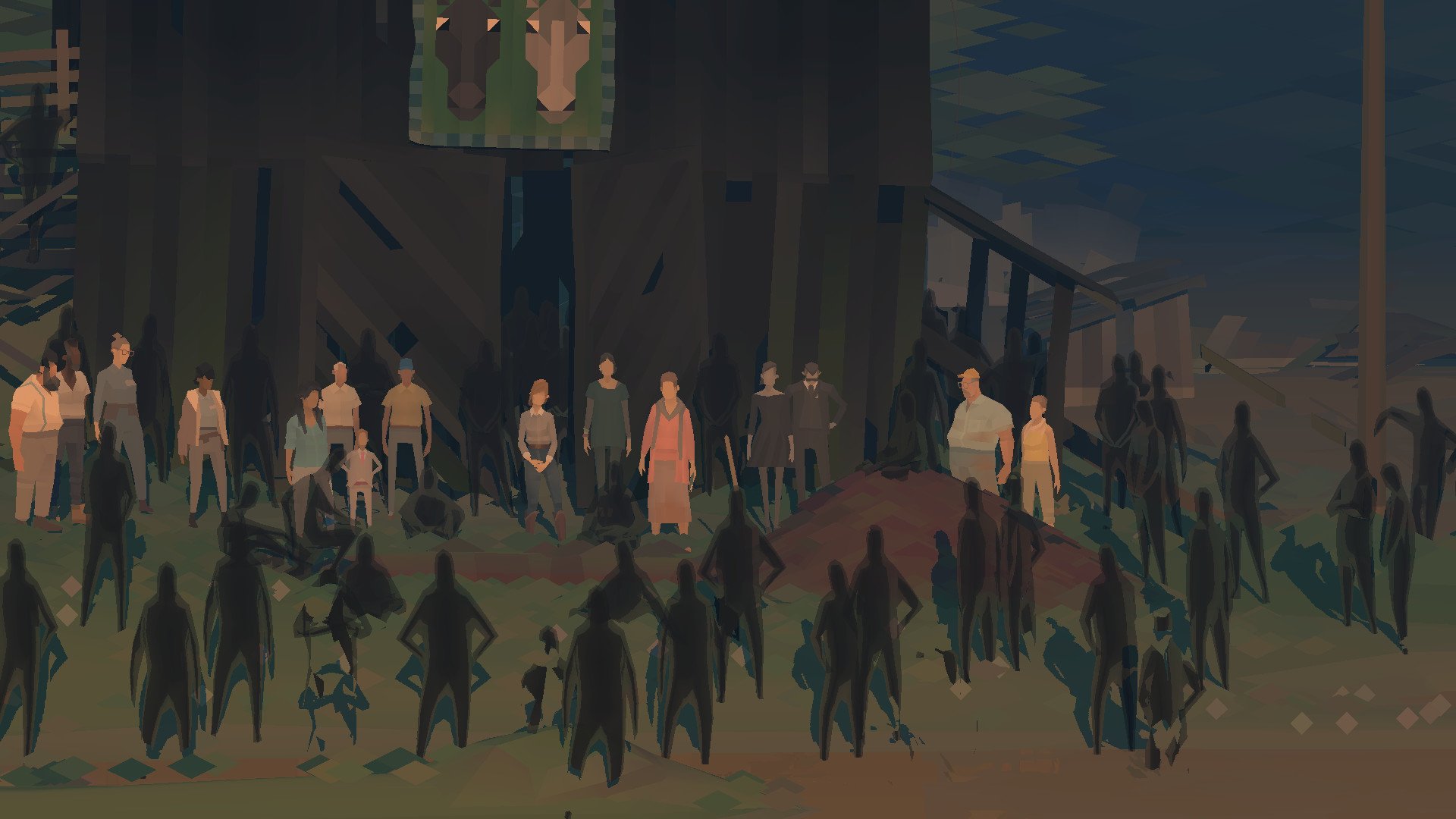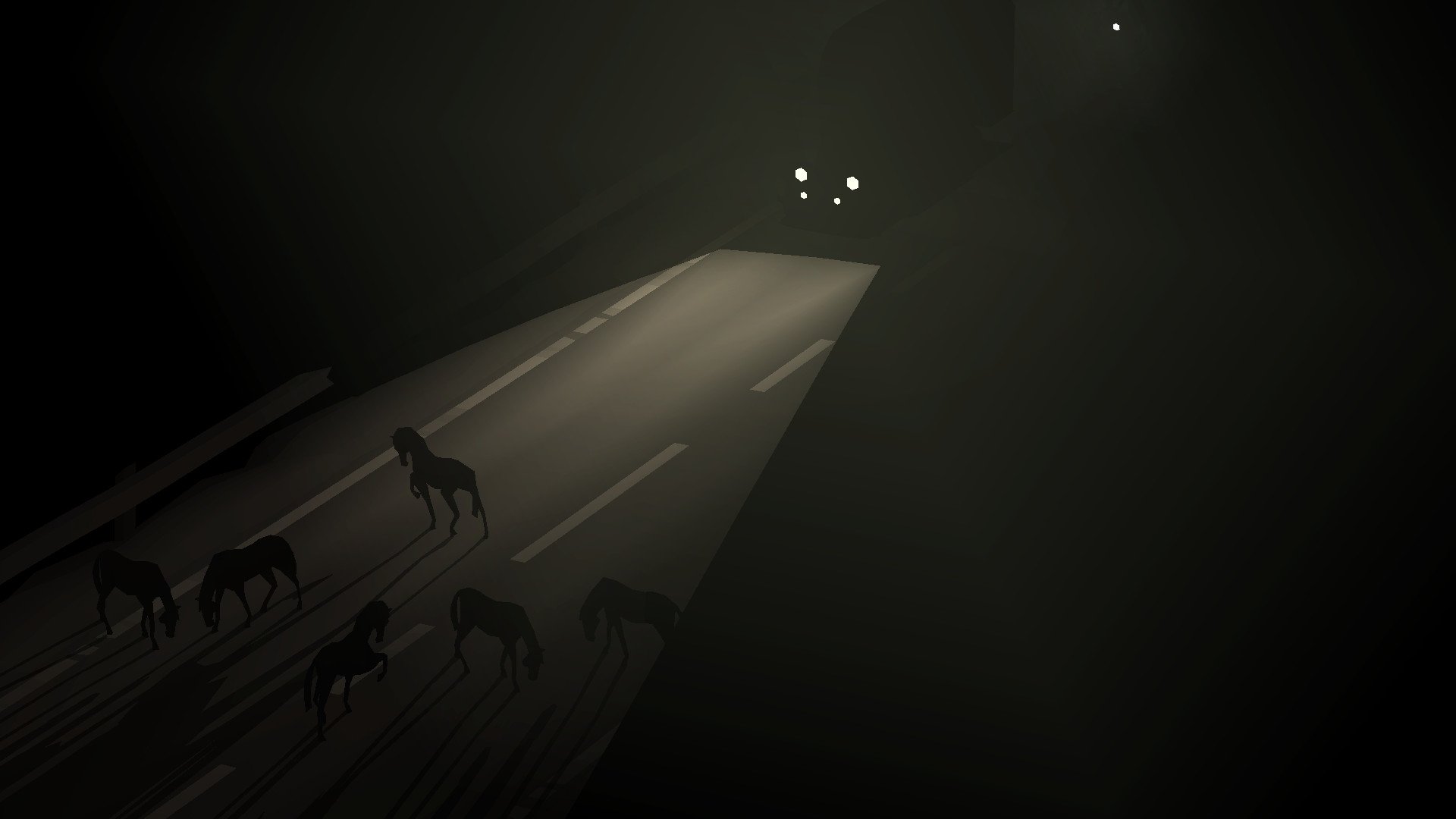This review took me so long to write.
Back in 2013, Kentucky Route Zero was one of the first games I ever wrote about professionally. That piece isn't even online anymore, so I couldn't tell you exactly what I said, but I do remember it was a tough endeavor. This game was funded on Kickstarter and sought to release five episodes. There was a lot to say about it, but also nothing.
It was atmospheric, mostly, capturing the pastoral and gloomy color palette that'll carry over into the other episodes — called Acts — along with the setup for a story involving a truck driver named Conway on his final delivery. To get there, he has to find the Zero, a mysterious highway system that he learns about through a series of ever-increasingly weird and possibly supernatural people. Over the first act, he has some strange encounters, introducing the player to how the game will bend the laws of reality in clever, sometimes funny ways. It was all set up for the dream-like world players would be entering once Conway actually got going on the Zero.
However, it was tough to see just from this first episode where Kentucky Route Zero would go over the next decade (along with how it would take seven years to reach Act V). The potential was there from the get-go, but there were still many questions. What would this game be about? If you take a look at the Kickstarter you can see what the game was expected to look like. You might notice that quite a few elements — from the art direction to even basic plot details — have changed, so it was a constant process even for the developers at Cardboard Computer.
The company also couldn't have foreseen that it would be making a game about several different Americas. It's next to impossible to have seen where America would be in 2020. As a budding journalist and critic fresh out of college at that time, I couldn't even begin to comprehend where we were headed; how things set up before I was born would pave the way for our current economic anxieties; how capitalism would begin to loom even uglier than before, moving away from the banks that caused the Great Recession of 2008 to Silicon Valley-based tech conglomerates.
In a sense, Kentucky Route Zero might be one of the most critical games of the past decade. It not only shows where America was but also where it is heading. It may have taken a long time to fully reveal itself, but watching the game grow and change over the past seven years has been just as satisfying as playing the game itself in one sitting can be. Players can certainly enjoy it in 2020 as a beautiful and somber poem about debt, poverty, loneliness, and, eventually, begrudging hopefulness, but, like Conway on his quest towards a delivery, it's rewarding as a story about journey and movement, rather than the final destination.
Take a journey
Kentucky Route Zero TV Edition
Bottom line: There are few other games like Kentucky Route Zero. The point-and-click/text-based adventure captures the economic anxieties and the loneliness of America in 2020, but it still manages to be hopeful amongst the tragedy. You don't want to miss this.
Pros:
- Somber look into America in 2020
- Gorgeous art style
- Haunting music
- Really nails the landing
- Plays around with interactivity beautifully
Cons:
- Movement can be janky
See at Microsoft Store See at GOG
Annapurna Interactive provided Windows Central with an Xbox One code for the purposes of this review.
But what is Kentucky Route Zero about?
It's tough to truly explain what Kentucky Route Zero is without spoiling it because it's absolutely worth experiencing without knowing much ahead of time. Here's what I can manage. It's about the aforementioned Conway and the delivery he has to make, but it only grows from there. You almost forget about the original goal as you get inundated with more characters and their stories, more locales, and more acts of high strangeness.
It's tough to truly explain what Kentucky Route Zero is without spoiling it.
I'll give you some examples. In one vignette you have to go up and down a bureaucratic office building to find some information; one of the floors is for the bears. At another moment slightly later you find yourself in the Museum of Dwellings, which is a museum depicting different dwellings (it's in the name) but is also the home of the people those dwellings once belonged to. They all chatter about you as you wander around. The Zero itself is an amorphous, ever-shifting highway where you have to follow directions like "turn around at the Crystal."
Beyond just the five acts there are also five interludes. These shorter stories take place at various points in the Kentucky Route Zero timeline and feature a lot of the same characters (many of them focus on a trio you meet early in Act I), but they're more abstract. Cardboard Computer uses these to play around with the concept of interaction, giving players different ways to experience them. One, as an example, takes place in a museum installation by one of the characters. You can only walk around in a circle, touching buttons to turn the works of art on, and then you just have to sit and listen or watch. In another, you are given nothing but a phone and a phone number, which you can call either through the game or on your actual phone.
In an interview with USGamer, sound designer Ben Babbitt noted how Kentucky Route Zero feels like "we made 10 different games." While he meant that in response to how long it took to make, it does legitimately feel like that. Each act and interlude is connected via characters, theme, and story, but the way each moves is unique. The rules change slightly between each, moving you between just controlling Conway to jumping between a handful of characters by having you control a cat, for example.
It all works to create this dreamlike flow, much like the Echo, which is a river you encounter later in the game. You're following the plot as one of the many named characters, but the more you're tasked with inhabiting them and controlling their actions, the less you care about what you were doing before. Conway is your gateway character, but soon you get to play Shannon, Ezra, Junebug, Johnny, a cat, and so many others. The goal set out in the first act becomes a distant memory as you continue, getting lost on the Zero and then the Echo, prowling for secret locations to explore, and losing track of yourself.
There are set points that you need to get to, but there are also ways to veer off on your own. The Zero especially provides a lot of these opportunities thanks to a brochure from the Bureau of Secret Tourism that gives directions to odd places. So while you can complete each act in an hour or two just by sticking to the important objectives, you can stretch that out. I've played through some of the early acts a few times and still found a lot I didn't catch the first time.
OK, but what is the game really about?
Kentucky Route Zero wants to hit you where it hurts. The writing is on the wall almost immediately as to what kind of world you've stepped into. The gas station you start off in is empty and the mine you travel to is abandoned. As you traverse the Zero you see the other signs: this is a world that's dying.
A lot of the people you meet are struggling, sometimes in different ways. A bar has to make a deal to stay afloat and the people in the museum have to live there because there's nowhere else to go. Sometimes the suffering is more nefarious. Two huge powers, the Consolidated Power Company and The Hard Times Distillery, trap people in endless cycles of poverty and debt while having their hands in a lot of the events of the game. A mine tragedy can be traced back to the power company and the distillery tricks people into servitude, but there aren't any consequences for either.
The world is filled with people drinking in lieu of doing anything else. Those same people talk a lot about things that have already happened or traditions that have died or memories that they might forget. It's made up of folks who stick around despite nothing worth looking forward to … beyond the possibility that maybe things will change.
Kentucky Route Zero is sad. It's one of the saddest games I've ever played. It's also one of the most impactful. It presents a story that points out clear issues but can't do anything about them. This is a broken system and there's no way to fix it in five acts. What we can do is live our relatively small lives and hope for the best.
This is what we carry into the final act.
Does it stick the landing?
Endings are an integral element of storytelling. A good or bad ending can make or break the pieces that came before it, so the build-up to Kentucky Route Zero Act V was both exciting and hesitant. After that long of a wait, can the final episode live up to expectations? As much as this is a review about the game as a whole, it's also mostly about Act V, which hit PC and consoles on Jan. 28.
What's most striking about this final act is how it both seems like a completely different game than what was presented in Act I but also makes perfect sense as it is.
In many ways, the last act is a reflection of the first. It's one of the shortest since Act I (not counting the interludes), but it's also the most meandering with, oddly, the least amount of exploration and discovery. While other acts have the player explore various locales, talk to strangers, or make phone calls, Act V just has you playing as a cat who runs around a singular space interacting with the groups of people. It's a simple way to get you out of the heads of the people you've been playing and into a more objective point of view to experience a catastrophe, but it's jarring at first. However, if you've played the game, this is about normal since it's always experimenting with various perspectives and ways to experience it.
And that's about it. You run around for a while and then it ends. It's almost the perfect ending.
What's most striking about this final act is how it both seems like a completely different game than what was presented in Act I but also makes perfect sense as it is. The goals set out by Conway, in the beginning, have completely vanished, washed away like a lot of the town you've found yourself in. The ending features many conversations between people you've met and others you haven't. They talk about getting up and starting over, but maybe also sticking around. They talk about tradition, guilt, and regret; of optimism and hope but also about reality and tragedy. In the game's final moments, you're forced to stop and listen to a song that both fills you with sorrow and joy. You feel hope for something that might never come.
Kentucky Route Zero doesn't wrap up with a neat bow, but that was never the intention. A game about loss and loneliness amidst a corrupt and oppressive system was never going to end happily or definitively. It was just going to end because that's what the developers wanted. The player is left with a feeling of emptiness as the game ends, but it's just open enough that we can expect more. The characters left to hang around in those final moments are off to do god-knows-what but that feels right. What was once here may be gone, but there's still more out there.
You can take this literally or metaphorically, for your own life or for the lives of those in the game. It all works the same way.
Bottom line: Should you play Kentucky Route Zero?
Considering all the words I've put down about the game, and all the gushing I've done, the answer should be obvious: yes this is a game I would recommend you play. More importantly, it's a game that needs to be played to be truly believed.
I spent a couple of days playing through Kentucky Route Zero for this review, but spent even longer trying to write it. There's so much to talk about; I haven't even gotten into the art style, which is simple but striking, or the music, which is haunting and odd, a combination that sums up the mood the game is going for. I didn't even feel comfortable talking about some issues I had with it (like how movement can sometimes be janky) because none of it mattered enough to mention.
I also didn't know how I totally felt. The game is somber and the experience finishing it isn't satisfying in a typical sense since nothing changes. The stories told are still just as full of sorrow as they were before the ending. None of those negative feelings matter in the end, since the tragedy is a part of the point. It's a reflection of current America's economic crisis, and it's filled with all the dread that thinking about the real world inflicts.
However, it's an experience that forces you to wonder about a lot — going out into the middle of nowhere and staring at the stars, living your life one step at a time, yearning to connect with that person behind the cash register at the gas station — and that's something that matters.
Kentucky Route Zero is out now on PC, Xbox One, PlayStation 4, and Nintendo Switch.
Country road
Kentucky Route Zero TV Edition
$25 at Microsoft Store See at GOG
It was about the journey all along
There are few other games like Kentucky Route Zero. The point-and-click/text-based adventure captures the economic anxieties and the loneliness of America in 2020, but it still manages to be hopeful amongst the tragedy. You don't want to miss this.







